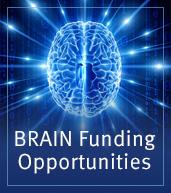
NIH recently re-issued seven notices of funding opportunities (NOFOs) for fiscal year 2017 to support neural recording and modulation technologies for the BRAIN Initiative. Three of the NOFOs call for large-scale recording and modulation of dynamic activity of neural circuits, supporting new experimental capabilities in animal models or humans. Four of the NOFOs support development of next generation invasive recording and/or stimulating devices to treat central nervous system disorders and thereby better understand the human brain….
The first three announcements, RFA-EY-17-001, RFA NS-17-003 and RFA NS-17-004, are re-issues of EY-16-001, NS-16-006 and NS-16-007, respectively. These NOFOs support new and/or improved technologies for large-scale recording and manipulation of neural activity.
- EY-17-001 supports innovative technologies that are in early stages of development, including new and untested ideas that are in the initial stages of conceptualization. Funding support can be for calculations, simulations, or models demonstrating proof-of-concept, or for prototypes, in-vitro, or other bench-top models to validate underlying theoretical assumptions, in preparation for future NOFOs aimed at testing in animal models or humans. It is expected that this research would be at a very early stage where preliminary data would not be available. This NOFO has a receipt date of December 7th, 2016.
- NS-17-003 encourages potentially high-risk research on new technologies and/or novel approaches to large-scale recording and modulation of neural activity that enable transformative understanding of the dynamic signaling in the nervous system. This NOFO has a receipt date of December 21st, 2016.
- NS-17-004 supports applications that optimize existing and emerging technologies for large-scale recording and modulation, intended for iterative refinement of approaches that have already demonstrated their transformative potential through initial proof-of-concept testing. Projects should focus on technologies that are appropriate for accelerated development of hardware/software, including scaling toward sustainable, broad dissemination and incorporation into regular neuroscience practice. This NOFO has a receipt date of December 21st, 2016.
For all three NOFOs, technologies should be compatible with experiments in behaving animals, and should include advancements that enable or reduce major barriers to hypothesis-driven experiments. Technologies may engage diverse types of signaling beyond neuronal electrical activity for large-scale analysis, and may utilize any modality such as optical, electrical, magnetic, acoustic, or genetic recording/manipulation. Projects should address major challenges associated with recording and manipulating neural activity at multiple spatial and/or temporal scales, in any region, and throughout the entire depth of the brain.
The next two NOFOs, RFA NS-17-005 and RFA NS-17-006, are re-issues of NS-16-009 and NS-16-010, respectively. Applicants to these NOFOs may develop their own devices, or they may take advantage of NIH’s BRAIN Initiative Public-Private Partnership (PPP) Program. This program facilitates early access by academic researchers to next generation neuromodulation and recording devices developed by commercial partners for human clinical studies. The final two NOFOs, RFA NS-17-007 and RFA NS-17-008, are re-issues of NS-16-011 and NS-16-018, respectively, which are a pair of Small Business Innovation Research (SBIR) NOFOs. The SBIR NOFOs use the U44 cooperative agreement mechanism, broadening the opportunity for small businesses to participate in the PPP program.
- NS-17-005 is for phased awards that support pre-clinical (UG3 phase) safety and design research, followed by a small clinical (UH3 phase) study, for invasive recording and/or stimulating devices to treat nervous system disorders, and thereby better understand the human brain.
- NS-17-006 supports small clinical (UH3 phase) studies to obtain critical information necessary to advance invasive recording and/or stimulating devices for human therapeutics.
- The first SBIR, NS-17-007, is for phased awards supporting preclinical safety and design testing followed by a small clinical study. This NOFO corresponds to NS-17-005 in its structure and goals.
- The second SBIR, NS-17-008, supports small clinical studies, corresponding to NS-17-006.
The receipt dates for all four of these RFAs (NS-17-005 through -008) are December 21st, 2016.
Please visit our Active Funding Opportunities page for more details on these and other RFAs for the BRAIN Initiative.
